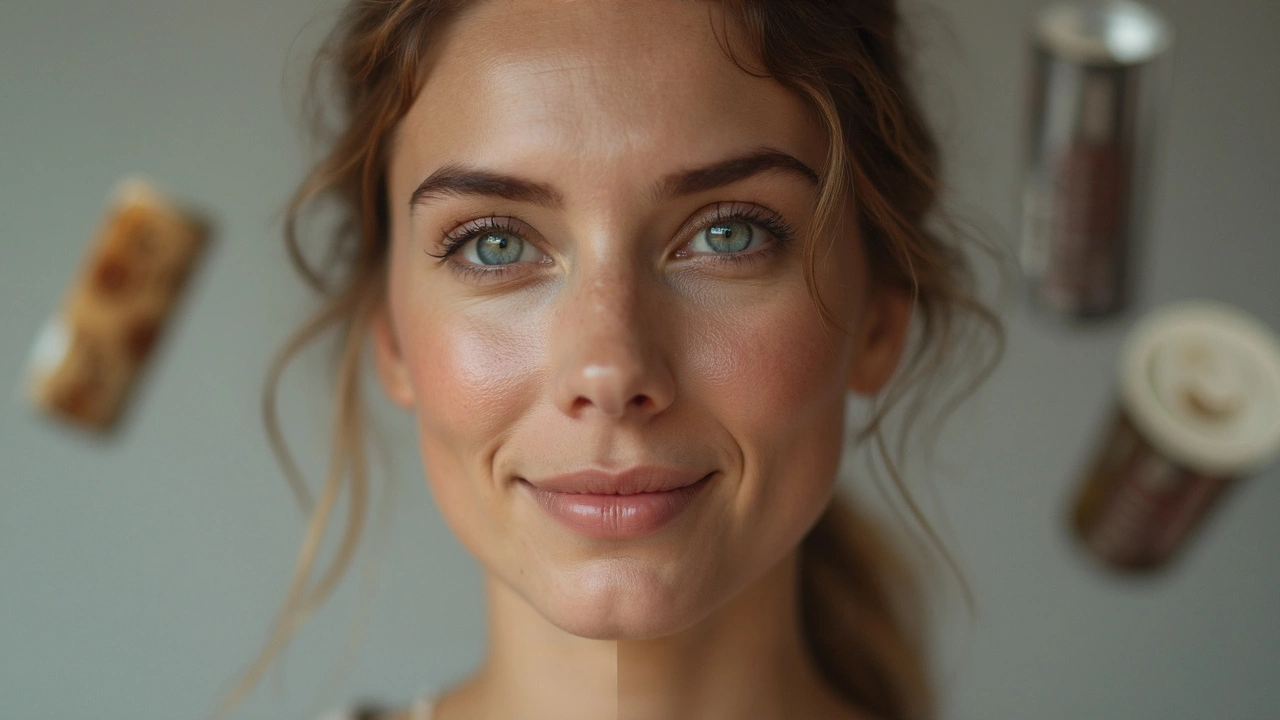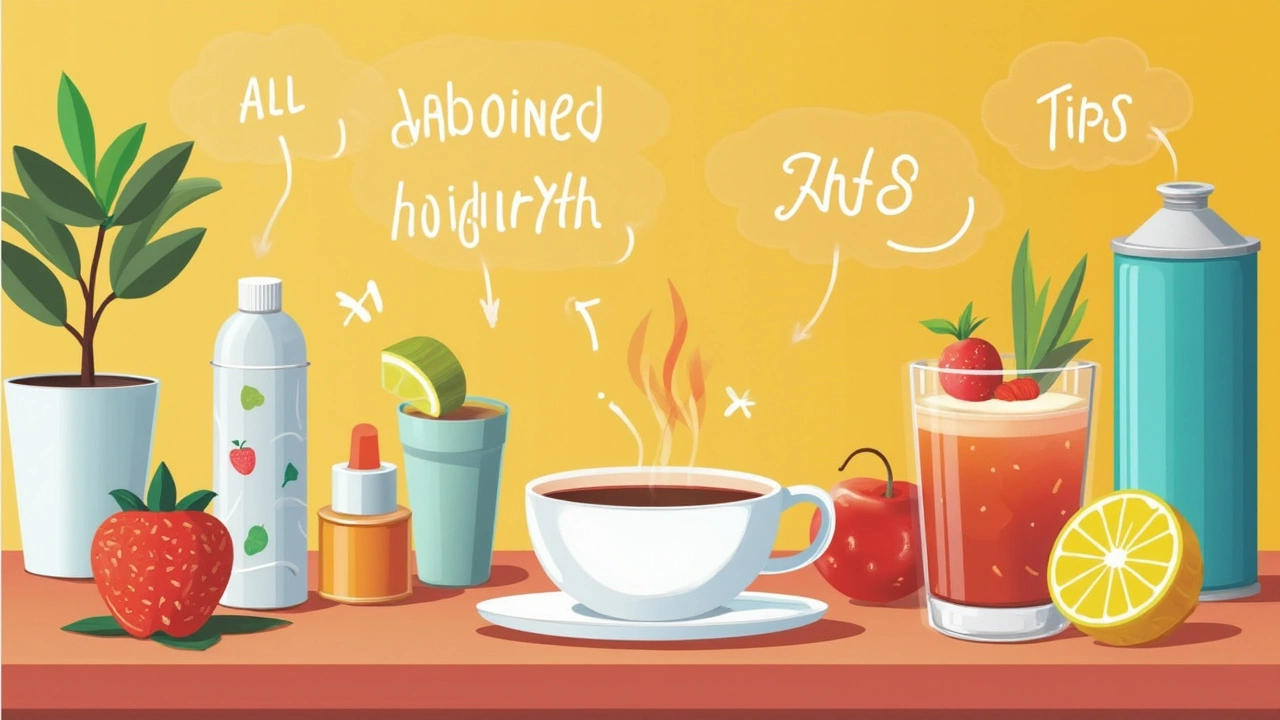This might sting a little if you can't start your day without coffee, but plenty of people wonder if all that caffeine is messing with their skin or making them look older. You see wild claims everywhere—'coffee gives you wrinkles!' or 'caffeine dries you out!'—but the truth is more complicated. If you're worried that your morning brew is fast-forwarding the clock on your face, you're not alone.
Here's the deal: caffeine does a lot more than just wake you up. It affects your body in different ways, depending on how much you drink and what your daily habits look like. Some folks swear by their coffee for energy and focus, while others worry about its impact on their skin, sleep, or hormones. Are those worries legit? Or can you keep drinking your cold brew and still keep your glow?
Let's get straight to what matters: what research and experts actually say about caffeine and aging. No fluff, no guilt trips—just the facts, plus some realistic tips if you want to enjoy your favorite drinks without feeling like you're adding years to your skin.
- How Caffeine Affects Your Body
- Caffeine and Your Skin: What Science Shows
- Can You Still Drink Coffee and Look Young?
- Signs You Might Be Overdoing Caffeine
- Tips for Enjoying Caffeine Without Aging Faster
How Caffeine Affects Your Body
Alright, here’s how caffeine gets to work after you take that first sip. It fires up your brain by blocking a chemical called adenosine, which normally makes you feel tired. So, instead of yawning, you feel alert and maybe a little amped up. That’s why coffee and energy drinks seem like life-savers on a sleepy morning.
But caffeine’s wiring goes way past your brain. It can make your heart beat a bit quicker and even spike your blood pressure short-term, especially if you’re sensitive or drink too much. That boost of energy is great for early meetings or long study sessions, but if you overdo it, you might feel jittery, restless, or even anxious. Sounds familiar?
Your body actually gets rid of caffeine through the liver, where it’s broken down and hangs around for about three to six hours (sometimes longer if you’re pregnant or on birth control). That’s why having late-afternoon coffee can mess with your sleep—it’s still floating around in your system when you hit the pillow.
Let’s look at how different amounts of caffeine stack up for the average adult:
| Drink | Average Caffeine (mg) |
|---|---|
| 8 oz Coffee | 80-100 |
| 8 oz Tea | 30-50 |
| 12 oz Soda | 30-40 |
| 8 oz Energy Drink | 70-120 |
For most healthy adults, up to 400 mg of caffeine a day is considered safe, which is about four cups of regular coffee. Go way over that, and you might start noticing side effects like headaches, a racing heart, or extra trips to the restroom. Long-term, heavy caffeine use can stress out your nervous system, interrupt sleep, and trigger stomach issues for some people.
If you’re wondering how all this ties back to aging, keep in mind that most trouble crops up when caffeine messes with sleep quality or leaves you dehydrated, both of which have a huge impact on how your skin and body age over time. And yes, hydration matters way more than you think!
Caffeine and Your Skin: What Science Shows
People always link caffeine with dehydrated skin and early wrinkles, but what's actually true? Let’s be practical about it: experts say a regular cup or even two of coffee isn’t going to dry out your face. Caffeine is a mild diuretic, sure, but for most people who drink normal amounts, the effect isn’t strong enough to pull the moisture out of your skin and keep it gone. In fact, if you drink enough water during the day, your skin probably won't even notice.
Now, let’s talk about skin aging and what really matters. Are you drinking six double espressos and skipping water? You might notice your skin looks tighter or more tired, but for the average coffee lover, major skin drama is rare. There’s actually a twist: recent lab studies found that caffeine can be good for your skin in certain ways! Topical creams with caffeine are famous in the beauty world for fighting puffy eyes and making skin look firmer—at least for a few hours. That doesn’t mean drinking it does the same, but it tells you caffeine isn’t always the villain.
Here’s what researchers have found when it comes to caffeine and aging:
- Normal coffee or tea intake is not directly linked to faster wrinkle formation. The big contributors to aging skin are UV rays and smoking, not that morning cup.
- Caffeine is full of antioxidants. These help fight free radicals, which can damage your skin cells and speed up aging. Coffee actually gives you some defense.
- Watch the extras. Sugary lattes and fancy syrups do more harm for your skin and aging than caffeine alone. Sugar can mess with collagen, and that’s what gives skin its bounce.
Want more numbers? A 2023 study out of South Korea looked at 2,000 adults and found no direct link between moderate caffeine intake and an increase in wrinkles, but they did see a clear jump in skin dryness in people who drank over five cups a day without enough water. So moderation, again, is key.
| Caffeine Habit | Effect on Skin |
|---|---|
| 1-3 cups/day | No major impact |
| Over 5 cups/day, low water intake | Possible dryness |
| With lots of added sugar | Higher risk of aging effects |
Bottom line: your anti-aging routine doesn’t need to cut out coffee or tea. Just keep your drinks simple and stay hydrated. Your skin cares way more about sunscreen than how much energy your morning gives you.

Can You Still Drink Coffee and Look Young?
Yes, you absolutely can enjoy your coffee and keep your skin looking youthful. It's not as dramatic as some headlines make it sound. Let’s break it down with facts and real-life tips.
For starters, moderate caffeine intake—think 1 to 3 cups of coffee a day—has not been linked to faster skin aging in any solid research. One big review published in 2023 in the Journal of Dermatology found no direct connection between regular coffee drinking and increased wrinkles. In fact, coffee is loaded with antioxidants that actually help fight free radicals, which are one reason for visible aging.
Dehydration is another topic that comes up a lot. Coffee can make you pee a bit more, but unless you’re chugging pots all day, it won’t dry out your skin if you’re also drinking enough water. Most people’s bodies adjust to the mild diuretic effect of caffeine after a while.
Here’s a quick rundown of some key factors if you want to keep drinking caffeine while still looking young:
- Balance it out: Pair your coffee habit with water throughout the day. It really does help.
- Go easy on the sugar and cream. Sugary or high-fat drinks can mess with your skin way more than caffeine itself.
- Don’t ignore sleep. Too much caffeine late in the day messes with shut-eye, and poor sleep is rough on your skin’s appearance.
- Consider your genetics. How quickly you process caffeine varies from person to person, and sensitive folks might see different effects.
Check out how coffee stacks up compared to other popular drinks for antioxidants that help with anti-aging:
| Beverage | Antioxidant Level (per 8oz) |
|---|---|
| Black Coffee | 200-550 mg |
| Green Tea | 80-200 mg |
| Soda | <10 mg |
Bottom line? Your morning coffee isn’t the villain when it comes to aging. Just stick with moderation, stay hydrated, and focus more on the big picture—like sun protection and a balanced diet—if you want your skin to stay fresh for years.
Signs You Might Be Overdoing Caffeine
It's easy to get carried away with your daily coffee habit—especially when those cute café cups keep calling your name. But there’s a line you don’t want to cross. Too much caffeine can backfire, and it doesn’t just mean you’ll be jittery. Here’s how to tell if your body’s reached its limit:
- Jitteriness or anxiety: Feeling on edge, jumpy hands, or racing thoughts? That's classic caffeine overload. You’re not more productive—you’re just more stressed.
- Trouble sleeping: If you find it hard to fall asleep or keep waking up at night, too much caffeine could be the reason, especially if you drink it after lunch.
- Frequent headaches: Oddly, overdoing caffeine can cause more headaches, not fewer, thanks to withdrawal effects and changes in blood flow.
- Digestive issues: Can’t figure out why your stomach is off? High doses of coffee and caffeine can upset your gut and even cause loose stools.
- Rapid heartbeat: If your heart feels like it’s doing a weird dance, it might be those extra cups talking.
- Skin looking dull or dry: Caffeine is a mild diuretic. Drink too much, and your skin could end up dehydrated—something folks chasing anti-aging secrets really want to avoid.
- Heavy afternoon crash: That intense slump by midday is your body running out of quick-fix energy. Instead of helping, caffeine can sometimes make you feel worse once it wears off.
If you’re looking for numbers, experts usually say around 400mg of caffeine per day—roughly four small cups of coffee—is the upper limit for most healthy adults. Here’s a quick look at where you might stand:
| Beverage | Avg. Caffeine (mg) |
|---|---|
| 8 oz Coffee | 90-120 |
| 8 oz Energy Drink | 70-100 |
| 12 oz Soda | 30-50 |
| 8 oz Black Tea | 40-70 |
Pay attention to these signs, especially if you mix coffee, tea, sodas, and energy drinks throughout the day. Sometimes, it’s not just your energy you need to watch—it’s your skin, mood, and sleep that send the clearer messages.

Tips for Enjoying Caffeine Without Aging Faster
If you love your daily dose of caffeine but want to keep your skin and body in top shape, there's good news: you don't have to quit your morning coffee. You just need to work with your body instead of against it. Here are smart ways to keep enjoying your latte without fast-tracking the signs of aging.
- Stay Hydrated: Caffeine is a mild diuretic, which means it makes you pee a bit more than usual. If you're worried about dry, tired skin, drink a glass of water with every cup of coffee or tea you have. A 2023 study in the journal Nutrition Reviews found people who drank enough water alongside their caffeine felt less dryness and had better skin texture.
- Limit Your Daily Intake: Experts recommend keeping it under 400mg per day—about 3 to 4 cups of brewed coffee or 8 cans of cola. Going wild on espresso shots or energy drinks can throw off your sleep and stress your skin.
- Mind Your Sleep: Nothing ages you faster than crummy sleep. Don't drink caffeine after 2 p.m. if you want solid rest. Poor sleep takes a toll on collagen, the stuff that keeps skin firm.
- Skip the Sugar Bombs: Fancy coffee drinks loaded with syrup and whipped cream can push your blood sugar through the roof. High sugar diets are linked to wrinkles and sagging skin. Go for simple coffee or tea when you can.
- Eat Skin-Friendly Foods: Vitamins A, C, and E help fight off skin damage. If you're a regular caffeine fan, load up on berries, citrus, nuts, and leafy greens to give your skin an extra boost.
| Beverage | Caffeine (mg per serving) |
|---|---|
| Brewed Coffee (8 oz) | 95 |
| Espresso (1 shot) | 63 |
| Black Tea (8 oz) | 47 |
| Energy Drink (8 oz) | 80 |
| Soda (12 oz) | 34 |
Here's what dermatologist Dr. Whitney Bowe says:
"You don't have to give up coffee for great skin. The real key is moderation, keeping hydrated, and making sure caffeine doesn't mess with your sleep."
If you pay attention to these factors, your daily caffeine habit isn't likely to sabotage your anti-aging goals. Make a few tweaks, watch how your body feels, and you can have your brew and drink it too.
